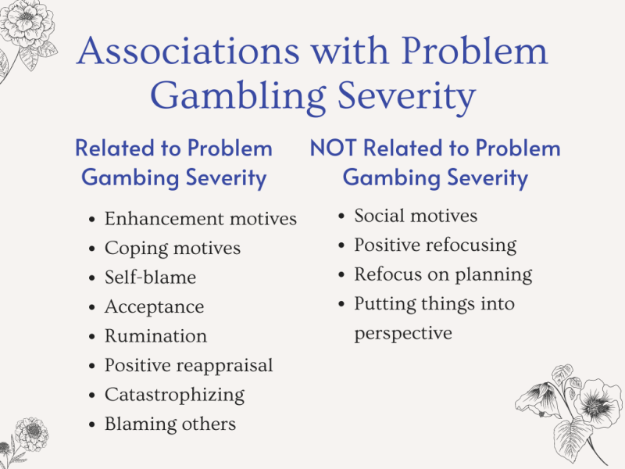“All you’ve got to do is stay away from gambling.” A woman described her experience with the stigma and blame of gambling problems by saying, “They look at it as being a weak person that is a problem gambler, someone that’s got no control over what they’re doing.” Shame and self-blame are common among people experiencing problem gambling, and they might intensify gambling problems by making it harder for people to regulate their emotions adaptively. This week, The WAGER reviews a study by Ana Estévez and colleagues that examined the relationship between shame and blame and problem gambling severity, as well as how emotion regulation mediates that relationship.
What was the research question?
How do shame and blame relate to problem gambling severity, and how does emotion regulation mediate that relationship?
What did the researchers do?
The authors surveyed 158 adolescents and young adults (119 males and 39 females of ages 12-30) from Northern Spain. Participants were divided into a non-clinical at-risk gambler group, a non-clinical problem gambling group, and a clinical problem gambler group based on their scores on the Spanish language version of the South Oaks Gambling Screen-Revised Adolescents scale. The researchers recruited the non-clinical samples from schools and the clinical sample from a treatment center. The researchers measure positive and negative moods, gambling motives, and emotion regulation. Next, they used Pearson’s r to assess the relationship between problem gambling severity, blame and shame, emotion regulation strategies for coping with negative life events, and gambling motives. Finally, the authors conducted a mediation analysis to examine the role of emotion regulation as a potential mediator in the relationship between problem gambling severity, and blame and shame.
What did they find?
Participants with more severe problem gambling reported feeling more shame and blame. Additionally, they were more likely to report that they gambled to enhance their moods and cope with stress (but not to socialize) and to use several strategies to cope with negative life events: self-blame, acceptance, rumination, positive reappraisal, and catastrophizing. Three strategies for coping with negative life events–positive refocusing, putting things into perspective, and re-focusing on planning–were unrelated to problem gambling severity, and blaming others was negatively related to problem gambling severity. Finally, in the mediation analyses, using self-blame to cope with negative life events partially accounted for the relationship between problem gambling severity and shame at present and during the past 2 weeks.

Figure. Key points from Estévez et al. (2022) about the relationship between blame, shame, emotion regulation, gambling motives, and problem gambling severity, showing variables that were statistically significantly related to problem gambling severity. Click image to enlarge.
Why do these findings matter?
Findings from studies such as this one can help inform evidence-based approaches to treatment and prevention. For example, learning that emotion regulation strategies like rumination and catastrophizing are related to problem gambling severity will allow for better-informed interventions such as dialectical behavior therapy (DBT), that teach healthier coping skills. Additionally, this study highlights the importance of conducting research on problem gambling in different contexts than the U.S., which speaks to the generalizability of predictors in other geographic locations, as (speaking very generally) blame is more prevalent in Western cultures, while shame is more dominant in Eastern cultures.
Every study has limitations. What are the limitations of this study?
This study had a small sample size, so the results might not be generalizable across Spain or other countries, such as the United States. Furthermore, because socio-cultural factors were not recorded, it is unclear whether they had an impact on the role of blame and shame. The results are also likely not representative of populations in other countries and cultures where blame and shame may have different prevalence levels. Additionally, this is a cross-sectional study, so causal relationships cannot be determined.
For more information:
Do you think you or someone you know has a gambling problem? Visit the National Council on Problem Gambling for screening tools and resources. For additional resources, including gambling and self-help tools, please visit The BASIS Addiction Resources page. For individuals in Spain, visit this article for information on the Problem Gambling helpline.
— Taylor Lee
What do you think? Please use the comment link below to provide feedback on this article.




